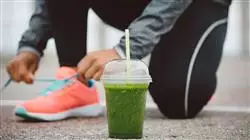University certificate
The world's largest faculty of pharmacy”
Introduction to the Program
With this 100% online program, you will elevate your skills to provide optimal individualized advice to patients suffering from muscular and metabolic disorders”

The World Health Organization warns that diseases linked to physical inactivity and metabolic disorders represent a significant burden for healthcare on a global scale. One example of this is obesity, which affects approximately 4 billion people. Faced with this reality, pharmacists need to understand the underlying mechanisms of Muscular and Metabolic Physiology to effectively address these health challenges. However, this can be challenging for professionals given their heavy workload and difficulty in balancing their work and leisure time.
To facilitate this task, TECH has developed an innovative program in Muscular and Metabolic Physiology. The academic itinerary will delve into issues such as muscle structure, carbohydrate metabolism or mixed bioenergetics of muscle fibers. Likewise, the syllabus will analyze the nutritional demands of athletes at different stages of the course (such as the pre-season, the competitive season or the holiday period). This will enable graduates to identify specific dietary needs at each moment and provide personalized advice to users according to their sports objectives. The program will also focus on the diet of Parathletes, examining specific factors such as their physiology, biomechanics or metabolism. In addition, a prestigious International Guest Director will offer a rigorous master class to examine the most recent advances in ergogenic aids.
TECH provides a 100% online methodology, adapted to the needs of pharmaceutical professionals who need to improve themselves and, at the same time, remain active in the workplace. In the same way, the university program stands out for implementing the disruptive Relearning system that avoids the memorization of concepts in an archaic way and, instead, enables their assimilation in a practical way. All of this, in addition to the advantage that specialists can plan their own schedules and delve into the contents at any time.
A renowned International Guest Director will offer an intensive Masterclass to bring you closer to the latest advances in Nutritional Supplements”
This Postgraduate diploma in Muscular and Metabolic Physiology contains the most complete and up-to-date scientific program on the market. The most important features include:
- The development of practical cases presented by experts in Nutrition and Dietetics
- The graphic, schematic and eminently practical contents with which it is conceived gather scientific and practical information on those disciplines that are indispensable for professional practice
- Practical exercises where self-assessment can be used to improve learning.
- Its special emphasis on innovative methodologies
- Theoretical lessons, questions to the expert, debate forums on controversial topics, and individual reflection assignments
- Content that is accessible from any fixed or portable device with an Internet connection
You will delve into the most cutting-edge techniques of Nutritional Monitoring of the athlete”
The program’s teaching staff includes professionals from the sector who contribute their work experience to this specializing program, as well as renowned specialists from leading societies and prestigious universities.
The multimedia content, developed with the latest educational technology, will provide the professional with situated and contextual learning, i.e., a simulated environment that will provide immersive education programmed to learn in real situations.
This program is designed around Problem-Based Learning, whereby the professional must try to solve the different professional practice situations that arise during the course. For this purpose, students will be assisted by an innovative interactive video system created by renowned and experienced experts.
Do you want to specialize in nutritional counseling for Parathletes? Achieve it through this program in only 6 months"

With TECH's Relearning system you will focus on the most relevant concepts and you will enjoy a totally natural learning process"
Why study at TECH?
TECH is the world’s largest online university. With an impressive catalog of more than 14,000 university programs available in 11 languages, it is positioned as a leader in employability, with a 99% job placement rate. In addition, it relies on an enormous faculty of more than 6,000 professors of the highest international renown.

Study at the world's largest online university and guarantee your professional success. The future starts at TECH”
The world’s best online university according to FORBES
The prestigious Forbes magazine, specialized in business and finance, has highlighted TECH as “the world's best online university” This is what they have recently stated in an article in their digital edition in which they echo the success story of this institution, “thanks to the academic offer it provides, the selection of its teaching staff, and an innovative learning method aimed at educating the professionals of the future”
A revolutionary study method, a cutting-edge faculty and a practical focus: the key to TECH's success.
The most complete study plans on the university scene
TECH offers the most complete study plans on the university scene, with syllabuses that cover fundamental concepts and, at the same time, the main scientific advances in their specific scientific areas. In addition, these programs are continuously being updated to guarantee students the academic vanguard and the most in-demand professional skills. In this way, the university's qualifications provide its graduates with a significant advantage to propel their careers to success.
TECH offers the most comprehensive and intensive study plans on the current university scene.
A world-class teaching staff
TECH's teaching staff is made up of more than 6,000 professors with the highest international recognition. Professors, researchers and top executives of multinational companies, including Isaiah Covington, performance coach of the Boston Celtics; Magda Romanska, principal investigator at Harvard MetaLAB; Ignacio Wistumba, chairman of the department of translational molecular pathology at MD Anderson Cancer Center; and D.W. Pine, creative director of TIME magazine, among others.
Internationally renowned experts, specialized in different branches of Health, Technology, Communication and Business, form part of the TECH faculty.
A unique learning method
TECH is the first university to use Relearning in all its programs. It is the best online learning methodology, accredited with international teaching quality certifications, provided by prestigious educational agencies. In addition, this disruptive educational model is complemented with the “Case Method”, thereby setting up a unique online teaching strategy. Innovative teaching resources are also implemented, including detailed videos, infographics and interactive summaries.
TECH combines Relearning and the Case Method in all its university programs to guarantee excellent theoretical and practical learning, studying whenever and wherever you want.
The world's largest online university
TECH is the world’s largest online university. We are the largest educational institution, with the best and widest online educational catalog, one hundred percent online and covering the vast majority of areas of knowledge. We offer a large selection of our own degrees and accredited online undergraduate and postgraduate degrees. In total, more than 14,000 university degrees, in eleven different languages, make us the largest educational largest in the world.
TECH has the world's most extensive catalog of academic and official programs, available in more than 11 languages.
Google Premier Partner
The American technology giant has awarded TECH the Google Google Premier Partner badge. This award, which is only available to 3% of the world's companies, highlights the efficient, flexible and tailored experience that this university provides to students. The recognition as a Google Premier Partner not only accredits the maximum rigor, performance and investment in TECH's digital infrastructures, but also places this university as one of the world's leading technology companies.
Google has positioned TECH in the top 3% of the world's most important technology companies by awarding it its Google Premier Partner badge.
The official online university of the NBA
TECH is the official online university of the NBA. Thanks to our agreement with the biggest league in basketball, we offer our students exclusive university programs, as well as a wide variety of educational resources focused on the business of the league and other areas of the sports industry. Each program is made up of a uniquely designed syllabus and features exceptional guest hosts: professionals with a distinguished sports background who will offer their expertise on the most relevant topics.
TECH has been selected by the NBA, the world's top basketball league, as its official online university.
The top-rated university by its students
Students have positioned TECH as the world's top-rated university on the main review websites, with a highest rating of 4.9 out of 5, obtained from more than 1,000 reviews. These results consolidate TECH as the benchmark university institution at an international level, reflecting the excellence and positive impact of its educational model.” reflecting the excellence and positive impact of its educational model.”
TECH is the world’s top-rated university by its students.
Leaders in employability
TECH has managed to become the leading university in employability. 99% of its students obtain jobs in the academic field they have studied, within one year of completing any of the university's programs. A similar number achieve immediate career enhancement. All this thanks to a study methodology that bases its effectiveness on the acquisition of practical skills, which are absolutely necessary for professional development.
99% of TECH graduates find a job within a year of completing their studies.
Postgraduate Diploma in Muscular and Metabolic Physiology
Muscle and metabolic physiology is a fascinating branch of science that explores how our muscles work together with our metabolism to keep us healthy and moving. For pharmacists, understanding these processes is critical, as it allows them to have an in-depth understanding of how drugs can affect muscle function and metabolic processes in the human body. Based on this, TECH Global University has developed its Postgraduate Diploma in Muscular and Metabolic Physiology for Pharmacists. An online postgraduate course created with the highest academic standards that will complement your studies in a dynamic and flexible way. In the syllabus, carefully designed by a team of experts, you will find relevant aspects such as the fundamentals of muscle physiology and the anatomical and physiological bases, to the cellular and molecular mechanisms involved in muscle contraction. You will learn how the nervous system controls muscle movements and function, and how different muscle fibers adapt to the demands of exercise and physical activity.
Master muscle and metabolic physiology
As a pharmacist, you will gain key insights into the impact of drugs on muscle and metabolic physiology. You will study the effects of drugs on muscle function and metabolic processes, and understand how this knowledge can be applied to pharmacy practice to improve the health and well-being of patients. In addition, you will delve into metabolic physiology and its relationship to this physical performance. You will explore how the human body utilizes nutrients and processes them through various metabolic pathways to generate energy and maintain homeostatic balance. You will learn about carbohydrate, lipid and protein metabolism, as well as the energy systems used during exercise and recovery. In short, this program represents the best opportunity to qualify as an expert in this field.







